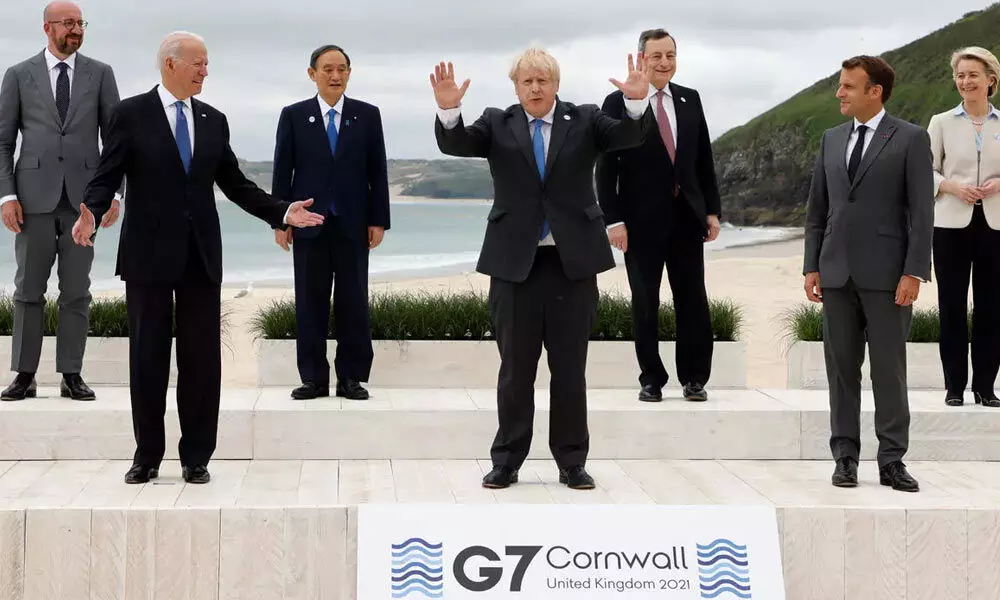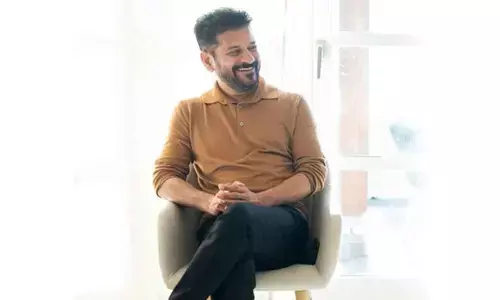Implication of G7 meeting on Covid, environment

Implication of G7 meeting on Covid, environment
For nearly a year- and- a-half during corona pandemics, virtual meetings among the partners had replaced the physical gatherings
For nearly a year- and- a-half during corona pandemics, virtual meetings among the partners had replaced the physical gatherings. For the first time after this pause, the leaders of G7 countries recently assembled at Cornwall resort at Carbis bay in United Kingdom. The group comprises United States, Canada, Japan, United Kingdom, Italy, France and Germany.
Boris Johnson, Prime Minister of host country, who chaired the meeting, had also invited heads of states from India, South Africa, South Korea and Australia to participate in agendas like Covid, trade and environment. Except Indian Prime Minister Narendra Modi, all other leaders attended three days discussion in person. Modi also addressed the gathering in three different sessions on virtual mode.
One of the major outcomes of the meeting is the decision that these nations would provide two billion doses of vaccines to poor nations. Indian Prime Minister while addressing them in the session emphasized that we must work on the principle, "one earth, one health", which was very much liked by members and guest nations. Much before this decision is announced, India had supplied 45 million doses of Covishield and 20 million doses of Covaxin to poor nations and also to some of our neighbours. We have driven the world to think on the line that nobody is safe until everyone is safe.
The group is being accused for promising only two billion doses not enough for the programme. As European nations, G7 nations, Soviet Union, India and China can take care of vaccinations in their countries, we need only five billion doses to cover poor nations entirely. There are some rich nations like South Africa, Australia, Gulf countries etc, who can definitely afford to buy doses from the countries engaged in producing it.
The pandemic had hit the unprecedented peak of 4.14 lakh cases of infection on May 9, nearly two weeks before it was projected by the experts. Remember the projection for the height of the peak was only 1.2 lakh cases. If the opposition cannot join the fire fighting by Government, they should not have caused disruptions and attempt to derail the process. Health infrastructure across the country was overwhelmed, yet Modi Government fought its way and turned around the situation.
While Government is on course to ramp up production of vaccine doses and promises vaccination for all adults by end of 2021, misinformation like Covaxin is manufactured using the serum of calves is spread. Besides vaccine hesitancy and wastages, the propaganda has the potential to ignite communal tension.
Prime Minister has also stated in the summit that India is the natural ally of G7 and has also emphasised on its civilizational commitment to democracy, liberty, freedom of expression etc. This should make our friends happy all over. Further it is the perfect reply to western media, who are engaged in false propaganda and setting up false narratives against us.
G7 has also attempted to counter China's action to expand its social and political influence through 'Belt Road Initiative' (BRI) with its 'Build Back and Better for the World' (B3W) aiming to fund the needy countries for resilient infrastructure, health, education and gender equality. Countries will now have better option through B3W. The move also hails India's interest to check China's growing influence in its neighboring countries like Bangladesh, Pakistan, Nepal and Sri Lanka. China has also been cornered as the G7 leaders call for respecting human rights in Xinjiang, Hong Kong and emphasizing peace and stability across Taiwan Strait.
G7 leaders have agreed to impose 15 per cent corporate tax of 100 largest companies and share it with countries where they operate. This aims to stop giant companies to shift their profits to low tax heavens through shell companies. Investment in countries like India is likely to be impacted by this decision.
On the question of 'Climate', G7 leaders have already committed to reduce their Green House Gas (GHG) emissions significantly by 2030 and further go on reducing to make it net zero by 2050. Paris Climate accord provides for 45% reduction of emissions by 2030 and all members of G7 have shown commitment to comply with it fully. They have also committed to become net zero by 2050. This was also known from the virtual summit of 40 polluting nations held by US President Joe Biden about two months back.
The worry on the climate front is that China has committed to become a country with net zero emission by 2060 with a rider that their peak emission is likely to be between 2030 and 2035. This means that China's emission will remain on upward growing trajectory till peak is achieved and in other words their economy till 2035 will be largely fossil fuel based. While G7 nations are committing to bring down emissions in this decade, China is swimming against the current. It is here G7 leaders have failed; they have not come out with any mechanism to bring China on board. Presently, China's emission of CO2 equivalent is one fourth of global emission, and the share would further increase as major economies cut their emissions progressively.
Indian Prime Minister in the G7 session emphasized our unwavering commitment to climate action and mentioned the stand of Indian railways to achieve net zero by 2030. He added that India is the only G20 country on track to meet its Paris commitment. On the question of G7 countries pressurizing us to commit net zero emissions by 2050, we are well aware that our giant polluters like NTPC and Coal India have also committed to become net zero by 2025, besides we have set ambitious renewable energy targets of 450 GW by 2030. When China has not set net Zero target by 2050, why should we? PM also called on G7 countries to meet their unfulfilled promise of 100 billion dollar annually in climate finance. This would be necessary for us to finance all our actions.
(The author is former Principal Chief Conservator of Forests (Head of Forest Force), Karnataka)














